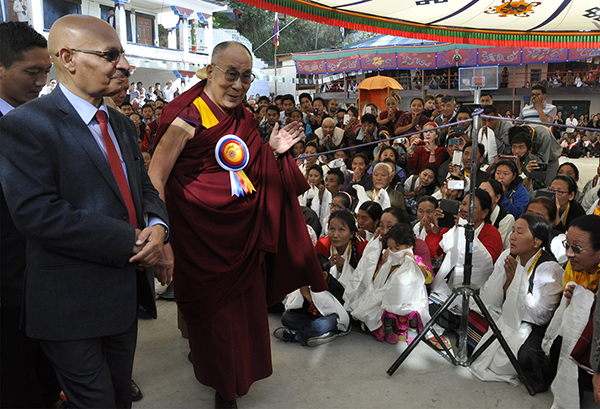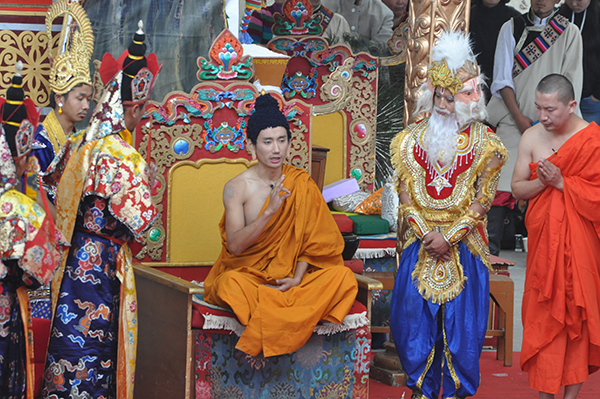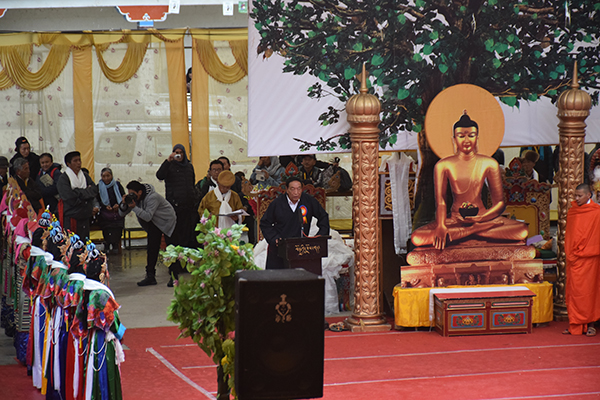The 20th Shoton festival, which celebrates the unique Tibetan artistic heritage of opera, was held at the Tibetan Institute of Performing Arts (TIPA) from March 27 to April 5 and attracting crowds of thousands. TIPA is a premiere body set up in 1959 in Dharamshala for the preservation of Tibetan culture and performance.
The Shoton festival is a centuries-old tradition which has its roots in ancient India. The origin of the festival in Tibet can be traced to the founding of the Drepung Monastery by Jamyang Choeje, the disciple of Je Tsongapa. It was originally observed in conjunction with the end of the summer retreat of the monastery, during which curd is offered to the monks and was then known as Drepung Shoton. This festival grew into to a fully-fledged festival of Tibetan opera performances. It was later revived in exile and produced by TIPA for the first time in 1993, at the encouragement and advice of His Holiness the Dalai Lama.
This year, the ten-day festival was inaugurated by His Holiness, who did not address the gathering but met members of eleven different opera troupes from India and Nepal. These included Mundgod, Bylakupee, Kathmandu, Kalimpong, Orissa, Bandhara, Mussoorie, Kollegal, Sharkhumbu, Chauntra and TIPA, as well as Kollegal, Sharkhumbu and Chauntra, which debuted at this Shoton but did not perform the full versions of their opera script.
The final and most anticipated performance took place on the last day and was attended by over 3,000 Tibetans and foreigners who came to watch the enactment of the life of Buddha, performed by TIPA artists. Written by Geshe Lobsang Drakpa, scripture master at Namgyal Monastery, the opera is a new addition to the list of Tibetan opera stories and was performed in Dharamshala for the first time in the history of Tibetan opera tradition.
The chief guest at the concluding function was Pema Chhinjor, the Kalon for the Department of Religion and Culture of the exile Central Tibetan Administration (CTA). In his address, he congratulated the various Lhamo (opera) Associations, particularly TIPA. He further told the gathering about the CTA’s commitment and its initiatives taken towards restoring and preserving the tradition of opera in exile, saying “A grant of Rs 4,000, which was proposed by the Kashag (Tibetan Cabinet), and approved by the Tibetan Parliament during its budget session, to revive the tradition of opera in exile have been provided to each opera association.”
Other attendees included Tibetan Prime Minister in exile, Sikyong Lobsang Sangay, the Speaker of the Parliament in exile,PenpaTsering, members of the Kashag, members of the Tibetan Parliament-in-Exile and CTA officials.
In Tibet, the festival is held each year from the end of the sixth month to the middle of the seventh month on the Tibetan Lunar calendar. These celebrations are strictly monitored and controlled by Chinese authorities who anticipate possible Tibetan demonstrations against China.







 Print
Print Email
Email